5G is a game-changer for law enforcement. It enables fast, reliable, and secure communications for the many wireless devices used by police officers. It can also help improve situational awareness. Drones, smartphones, laptops, tablets, body cameras and license tag readers today rely on 5G’s ultra-low latency connections and fast uploads and downloads.
Most of these devices cannot operate effectively using older wireless standards prior to 4G LTE. 5G networks support improved reliability, data security, and speed of data transfer. Police officers can take advantage of 5G capabilities to digitize reporting so they can spend more of their time in the field. Digi’s purpose-built 5G connectivity solutions help law enforcement agencies select the best end-to-end solution regardless of their budget.
From body cameras and drones to smartphones and laptops, devices powered by 5G in law enforcement use cases rely on fast, robust, and secure communications. In this article, we will explore how 5G is impacting law enforcement agencies.
What 5G Means for Law Enforcement
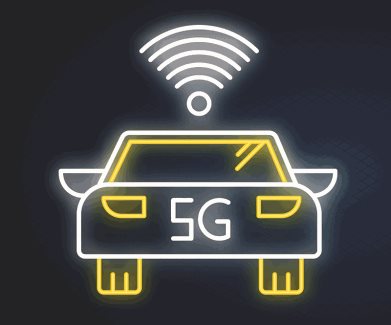 The use of technology in policing is advancing constantly, and police officers today have access to many technologies that improve situational awareness and safety. Most of these technologies didn’t exist a generation ago. Drone video surveillance keeps officers safely updated on changing situations in real time. License tag readers can automatically detect and alert officers to potential issues. Body cameras can provide officer safety and improve evidence quality.
The use of technology in policing is advancing constantly, and police officers today have access to many technologies that improve situational awareness and safety. Most of these technologies didn’t exist a generation ago. Drone video surveillance keeps officers safely updated on changing situations in real time. License tag readers can automatically detect and alert officers to potential issues. Body cameras can provide officer safety and improve evidence quality.
All these applications need robust, secure, and reliable networks and the speed that 5G delivers. 5G speeds data transfer at 10 times the speed of 4G LTE and reduces latency to milliseconds.
For these reasons, 5G solutions designed for law enforcement enable officers to work more safely and efficiently. Here are a few examples of key benefits of 5G for police:
- The speed and throughput of 5G enables technologies like facial recognition for rapid identification of individuals involved in incidents.
- With 5G, officers can capture, share and receive data-intensive live video streams from drones, cars or body cameras that improve situational awareness
- 5G speed enables rapid data transfer between at-the-scene situations and the precinct.
- With 5G, technology developers can integrate the vast capabilities that sensors offer, such as temperature sensing as well as movement tracking, with reduced latency
- 5G enables officers to digitize their reporting; police reports that include audio and video can provide better context and can be shared seamlessly across agencies
Download the Digi SAFE™ Connectivity Solutions brief to learn about Digi’s complete, purpose-built end-to-end emergency responder vehicle connectivity solution.
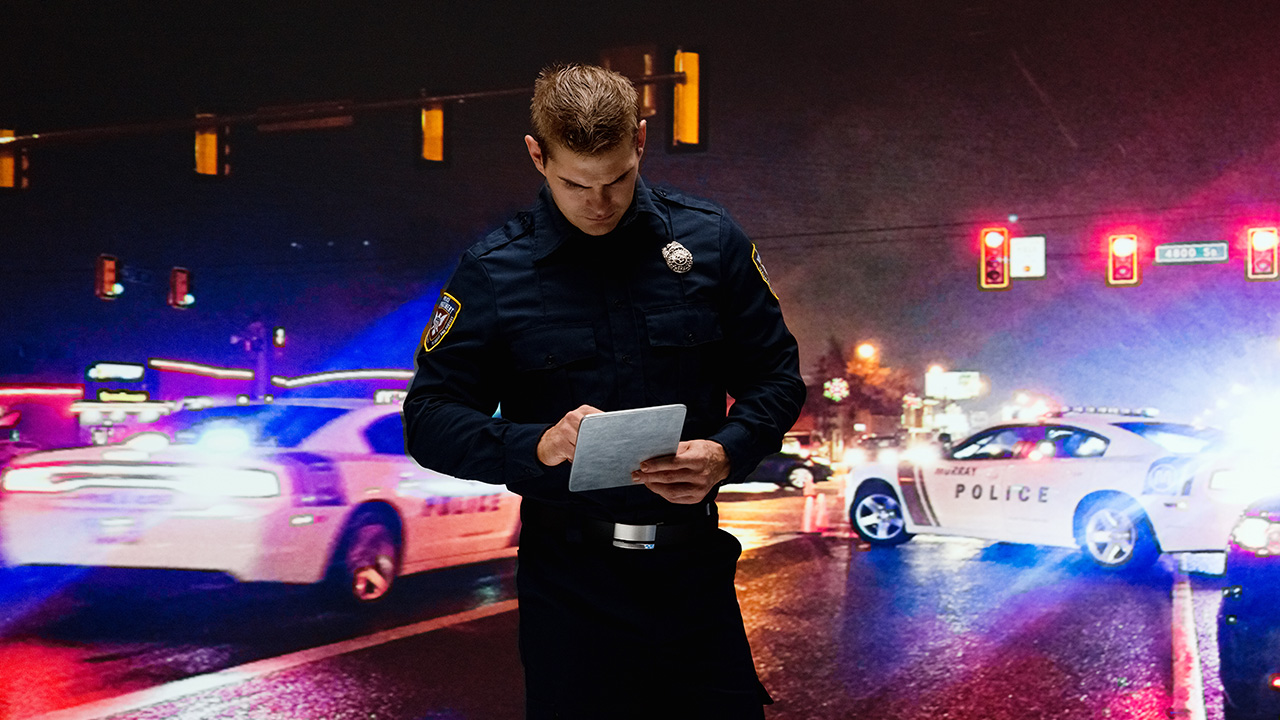
Common Uses for 5G in Law Enforcement
Scanning CCTV footage as a situation unfolds or transmitting drone footage to a cruiser in real time are just two uses for 5G in law enforcement. Because 5G has significantly higher data rates than 4G, new applications of IoT devices become possible. As artificial intelligence technology matures, 5G will enable even more law enforcement use cases in the future. Yet, even current police technologies benefit greatly from 5G networks.
Police Wireless Networks
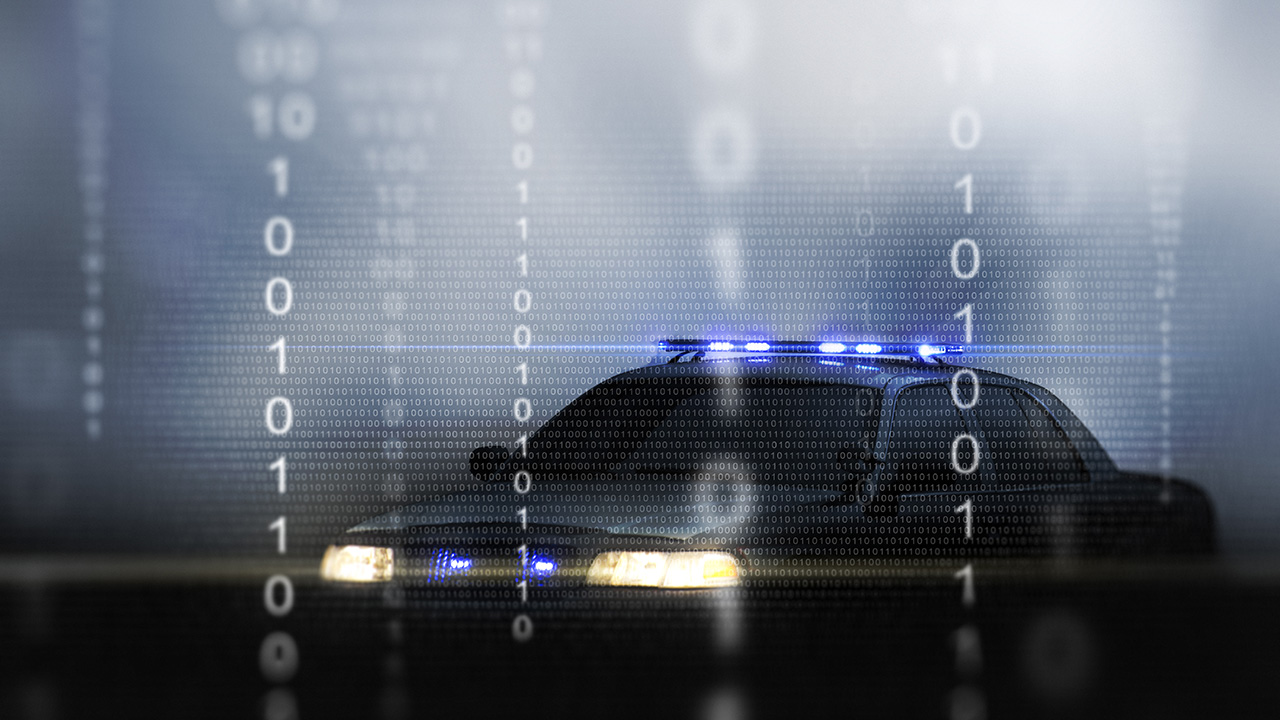
Almost every aspect of policing can use wireless technologies to make jobs easier, safer, and more efficient. Many of the newer applications such as real-time video, and situational awareness data require the capacity, speed, and ultra-low latency only 5G can deliver.
For example, 5G powers connectivity not only for police and fire, but for connected command vehicles as well. These mobile emergency response and law enforcement vehicles may provide the only communication network during an emergency. Connected devices such as cameras, sensors and drones can capture and share real-time, high-definition video from these mobile networks. 5G also powers public safety communications networks such as FirstNet®. It is a dedicated network used by first responders during natural disasters or terrorist attacks.
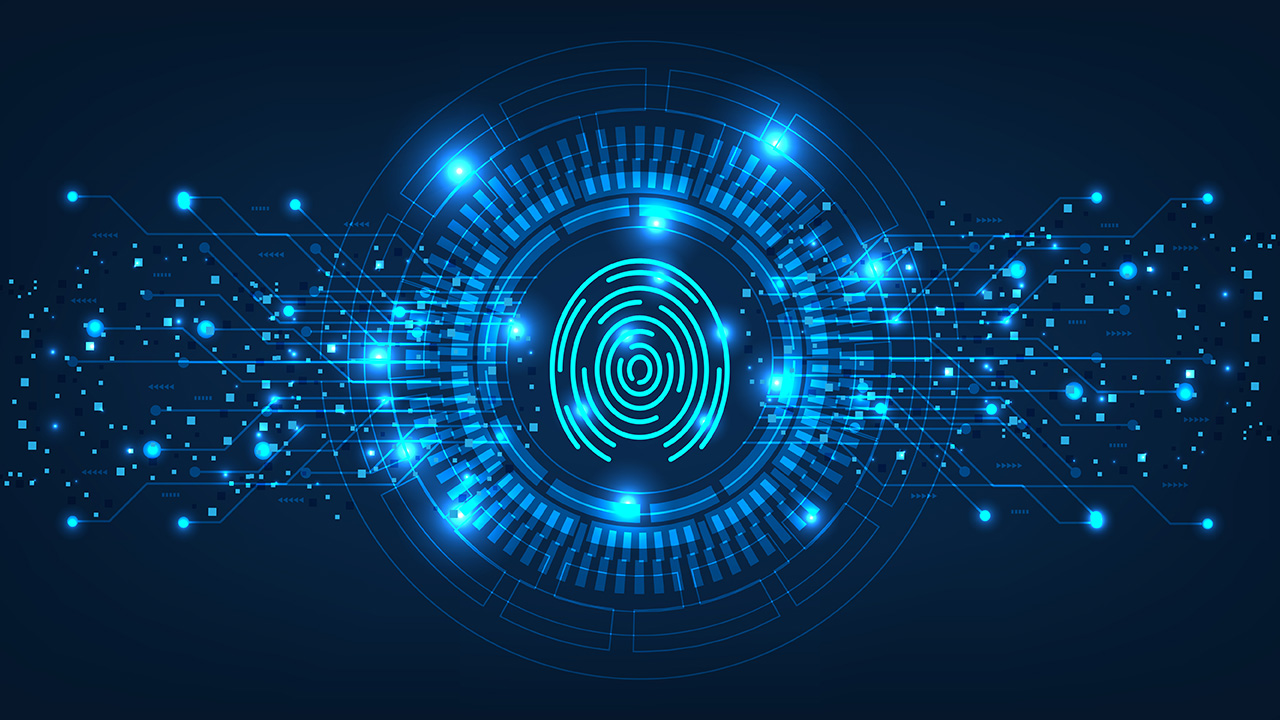
Here are some common police applications that benefit from 5G networks:
Police Cruiser Computers
In some respects, a police cruiser in the IoT era resembles a computer as much as a vehicle. It contains many installed connected devices such as laptops, dashboard cameras and license plate readers. It also supports Wi-Fi for devices outside the vehicle such as officers’ smartphones, tablets, drones, AR headsets and body cams for streaming live video back to the precinct.
At up to 100 times faster than 4G, 5G technology provides high-speed connections, streams massive amounts of data and supports large numbers of connected devices. And it transfers information more securely than 4G thanks to built-in data encryption.
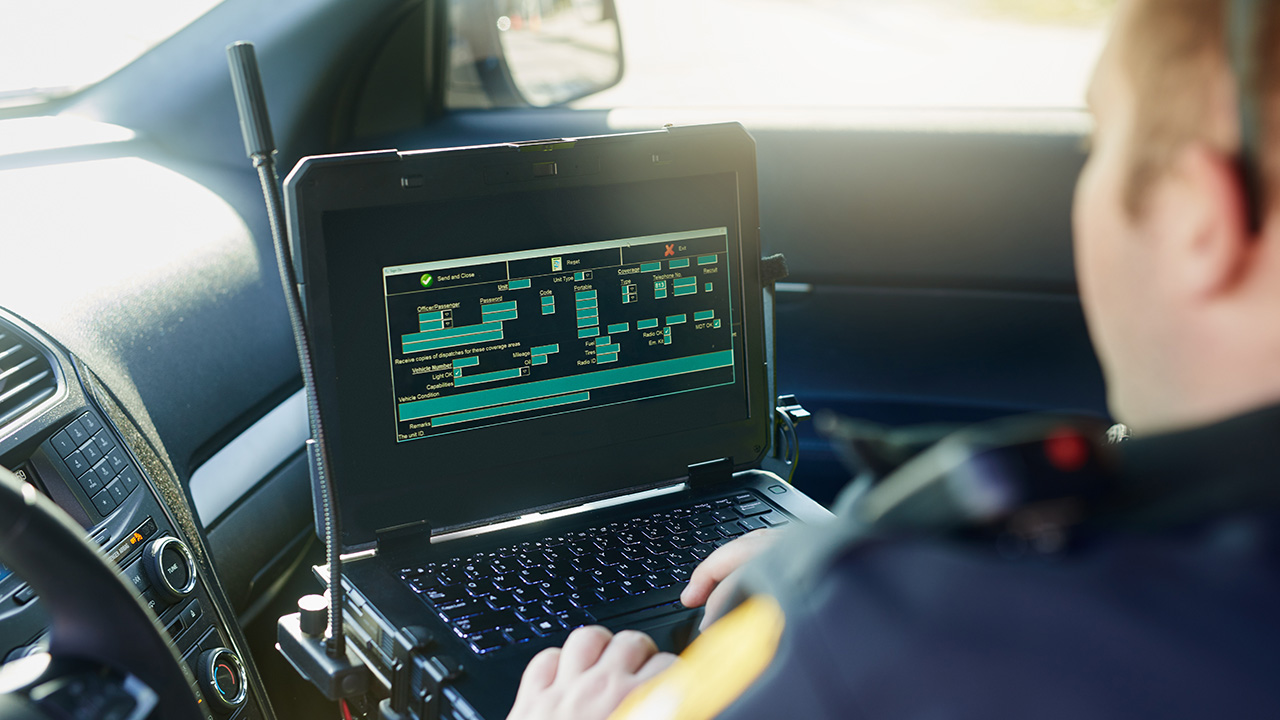
Here are some police cruiser applications enabled by 5G
- License plate scanners – With 5G’s high data throughput and low latency, cruisers can immediately share license plate information in real-time to increase efficiency and situational awareness
- Speech recognition – Police cruisers were not designed as offices, so speech-to-text applications make it easier for officers to file reports in the field using their voice
- Power efficiency – Although most of the 5G hype is around speed and low latency, 5G is also extremely energy efficient to allow for longer operation when the vehicle’s ignition is off
Drone Technologies
It used to be that a police unit’s “eyes in the sky” belonged to a helicopter pilot. Thanks to 5G and drone technology, more police units today are using drones to get real-time situational awareness via live video directly from the drone. Drones provide massive cost savings compared with helicopters and can perform many of the same tasks easily. Best of all, they’re portable, easier, and safer to pilot than a helicopter.
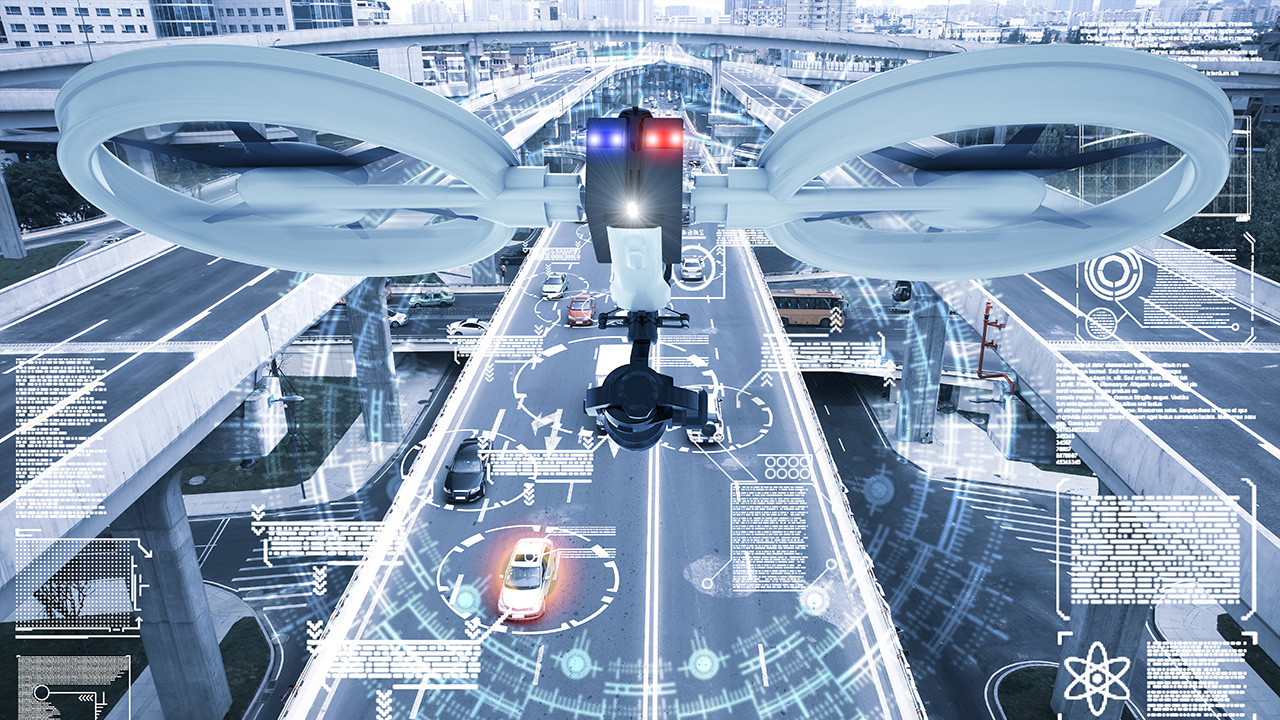
Officers even use drones for traffic monitoring, adjusting traffic routes based on drone footage. There are many ways police officers use drone technologies with 5G to improve situational awareness and response efficiency.
Here are a few common applications:
- Tethered drones – Drones held stationary with a tether allow for continuous monitoring of an area and can even be mounted on police cruisers
- Indoor operations – Police officers can use drones to identify and communicate with suspects inside buildings, making the situation safer for officers to respond
- First responders – The Chula Vista police department piloted a drone deployment project to launch drones as an extra response to 911 calls, providing situational awareness for officers responding to the scene
- Speed monitoring – Since police cruisers cannot monitor all roadways in a given area at all times, drones can quickly extend coverage, and can be quickly repositioned, regardless of traffic conditions
4 Benefits of 5G for Law Enforcement
As we have already discussed, 5G enables important wireless police work. 5G has been purposely designed for speed, reliability, security and efficiency. 5G promises vastly improved download and upload speeds over what can be achieved over 4G networks. Its reduced latency means almost instantaneous communications compared with 4G, as 5G has up to ten times lower rates than 4G. Its support for the massive capacity of connected devices will be game-changing for any law enforcement network.

Faster
In emergencies, response time is crucial. The same applies to digital device connections. When every second counts, communication delays or slow connections limit situational awareness. Faster connections enable a drone to share a real-time video of a disaster. This information can help responding officers detect dangerous areas, survivors, and the best travel routes.
More Secure
5G is secure by design. As part of the 5G standards, it uses mutual authentication, which means it confirms and establishes end-to-end trust between sender and receiver. 5G also encrypts network traffic to make it unreadable if intercepted. Because of these standards, 5G networks provide more protection than 4G and earlier network standards. Law enforcement officials share sensitive information through wireless networks daily as part of their jobs. A breach could endanger lives.
Smart cities also enjoy 5G security for public safety. Ultra-high bandwidth and low latency 5G and edge computing make real-time image recognition possible. Integrated security systems can call the police and share vehicle and other information with them.
Reliable
When your job is mission-critical, reliability is the most important aspect of your communications. Today’s technology offers high reliability and ultra-low latency to support 5G emergency services. In fact, according to a Verizon Frontline survey, 77 percent of respondents said that reliability and speed are their number one priority. Survey respondents also name unreliable networks as one of their top challenges.
Efficient
Police officers rely on communications technology to do their jobs. Slow or lost connections mean important information may not reach officers in time. Many officers rely on smartphones for up-to-date situational awareness. Other use of information technology by law enforcement includes using voice recognition to file reports and accessing criminal databases from a smartphone or tablet device. 5G connectivity enables all these use cases. It creates opportunities for improved efficiency in almost every aspect of police work.
Download the Digi SAFE™ Brief to learn more about Digi’s public safety connectivity solution
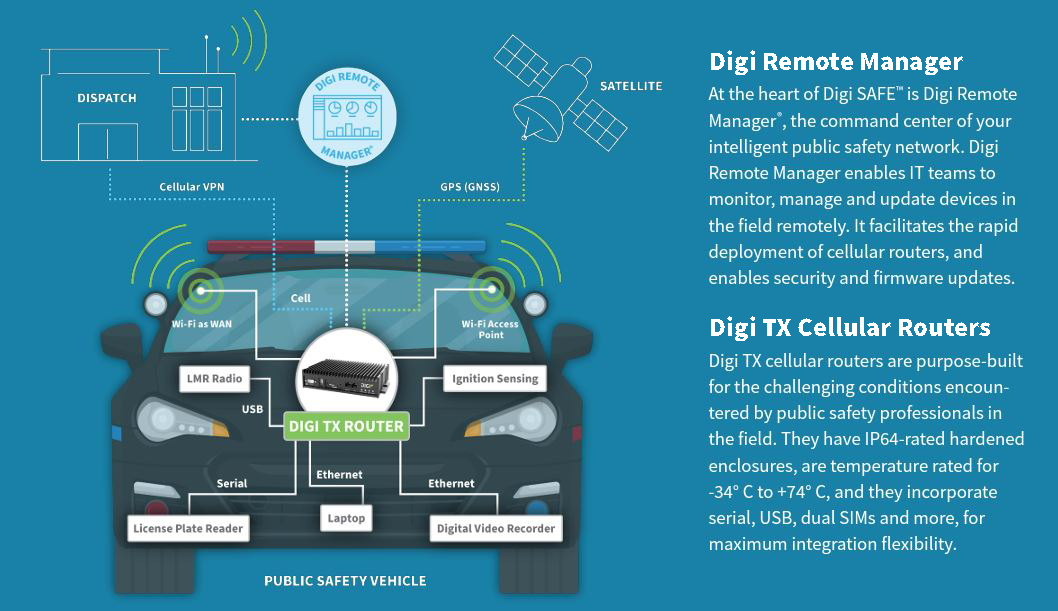
There is no doubt that 5G police communication networks help make an officer’s work safer, more reliable, and more efficient. Solutions for law enforcement must provide ultra-low latency and blistering speeds. The logical next step is to select a 5G enablement partner.
That’s where Digi can help.
Digi has been building wireless communications solutions since 1985. We create purpose-built, end-to-end solutions for key industries. Digi designed and built Digi SAFE™, an all-in-one connectivity solution for public safety and transportation agencies.
The Digi TX40 5G cellular router is an intelligent 5G wireless hub designed with fleet and public safety vehicles in mind. Not only does it meet U.S. security standards, including FIPS-140-2, but it is also FirstNet® certified and connects seamlessly with Digi Remote Manager®.
And when you need assistance identifying the right solution for your agency's needs, and planning your deployment, Digi Professional Services has the expertise to support your team at any point along the way.
Next Steps